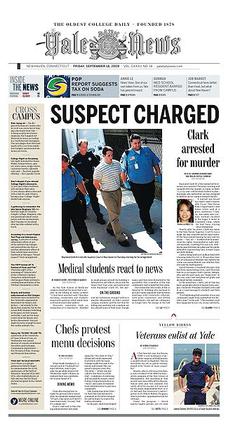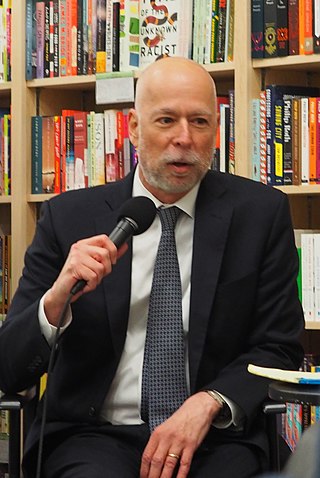
The Yale Daily News is an independent student newspaper published by Yale University students in New Haven, Connecticut since January 28, 1878. It is the oldest college daily newspaper in the United States.
Jay Anthony Lukas was an American journalist and author, best known for his 1985 book Common Ground: A Turbulent Decade in the Lives of Three American Families. Common Ground is a classic study of race relations, class conflict, and school busing in Boston, Massachusetts, as seen through the eyes of three families: one upper-middle-class white, one working-class white, and one working-class African-American.

Joseph Anthony Lewis was an American public intellectual and journalist. He was a two-time winner of the Pulitzer Prize and was a columnist for The New York Times. He is credited with creating the field of legal journalism in the United States.

The Authors Guild is America's oldest and largest professional organization for writers and provides advocacy on issues of free expression and copyright protection. Since its founding in 1912 as the Authors League of America, it has counted among its board members notable authors of fiction, nonfiction, and poetry, including numerous winners of the Nobel and Pulitzer Prizes and National Book Awards. It has over 9,000 members, who receive free legal advice and guidance on contracts with publishers as well as insurance services and assistance with subsidiary licensing and royalties.

Harry Scott Ashmore was an American journalist who won a Pulitzer Prize for his editorials in 1957 on the school integration conflict in Little Rock, Arkansas.
Jean Valentine was an American poet and the New York State Poet Laureate from 2008 to 2010. Her poetry collection, Door in the Mountain: New and Collected Poems, 1965–2003, was awarded the 2004 National Book Award for Poetry.

Catharine Drew Gilpin Faust is an American historian who served as the 28th president of Harvard University, the first woman in that role. She was Harvard's first president since 1672 without an undergraduate or graduate degree from Harvard and the first to have been raised in the South. Faust is also the founding dean of the Radcliffe Institute for Advanced Study. She has been ranked among the world's most powerful women by Forbes, including as the 33rd most powerful in 2014.

Adam Liptak is an American journalist, lawyer and instructor in law and journalism. He is the Supreme Court correspondent for The New York Times.
The Harvard Law Record is an independent student-edited newspaper based at Harvard Law School. Founded in 1946, it is the oldest law school newspaper in the United States.

The Burger Court was the period in the history of the Supreme Court of the United States from 1969 to 1986, when Warren E. Burger served as Chief Justice of the United States. Burger succeeded Earl Warren as Chief Justice after the latter's retirement, and served as Chief Justice until his retirement, at which point William Rehnquist was nominated and confirmed as Burger's replacement. The Burger Court is generally considered to be the last liberal court to date. It has been described as a "transitional" court, due to its transition from having the liberal rulings of the Warren Court to the conservative rulings of the Rehnquist Court.

Eliza Griswold is a Pulitzer Prize–winning American journalist and poet. Griswold is currently a contributing writer to The New Yorker and a Distinguished Writer in Residence at New York University. She is the author of Amity and Prosperity: One Family and the Fracturing of America, a 2018 New York Times Notable Book and a Times Critics’ Pick, for which she won the Pulitzer Prize for general nonfiction and the Ridenhour Book Prize in 2019. Griswold was a fellow at the New America Foundation from 2008 to 2010 and won a 2010 Rome Prize from the American Academy of Arts and Letters. She is a former Nieman Fellow and a current Berggruen Fellow at Harvard Divinity School, and has been published in The New Yorker, Harper's Magazine, and the New York Times Magazine.

Pamela Susan Karlan is an American legal scholar who was the principal deputy assistant attorney general in the Civil Rights Division of the United States Department of Justice from February 8, 2021 until July 1, 2022. She is a professor at Stanford Law School. A leading legal scholar on voting rights and constitutional law, she previously served as U.S. Deputy Assistant Attorney General for Voting Rights in the DOJ's Civil Rights Division from 2014 to 2015.
Stanton v. Stanton, 421 U.S. 7 (1975), is a United States Supreme Court case which struck down Utah's definitions of adulthood as a violation of equal protection: females reached adulthood at 18; males at 21.

Farah Nisa Stockman is an American journalist who has worked for The Boston Globe and is currently employed by The New York Times. In 2016, she was awarded the Pulitzer Prize for Commentary.

Sanford Victor Levinson is an American legal scholar known for his writings on constitutional law. A professor at the University of Texas Law School, Levinson is notable for his criticism of the United States Constitution as well as excessive presidential power and has been widely quoted on such topics as the Second Amendment, gay marriage, nominations to the Supreme Court, and other legal issues. He has called for a Second Constitutional Convention of the United States.
The Greenhouse effect is a theory of U.S. Supreme Court justices' behavior postulate a tendency of conservative Supreme Court Justices to vote with the liberals more often as their careers progress due to a desire for favorable press coverage. The idea was first proposed by Hoover Institution economist Thomas Sowell and popularized by D.C. Court of Appeals Senior Judge Laurence Silberman in a speech to The Federalist Society in 1992. Silberman said "It seems that the primary objective of The Times's legal reporters is to put activist heat on recently appointed Supreme Court justices."

Eugene Roy Fidell is an American lawyer specializing in military law. He is currently the Florence Rogatz Visiting Lecturer in Law at Yale Law School.

Hannah Margalit Fidell is an American film director, producer and screenwriter. Her directorial debut was the drama film A Teacher (2013). She also wrote and directed the romantic drama film 6 Years (2015) and the comedy film The Long Dumb Road (2018).
Carol J. Greenhouse is an American anthropologist known for her scholarship on law, time, democracy, and neoliberalism. She is currently professor emerita in the Department of Anthropology at Princeton University, where she previously served as Arthur W. Marks Professor of Anthropology and Department Chair. She is also the former president of the American Ethnological Society (2013-2015), former editor of its peer-review journal, American Ethnologist (1998-2002), and former president of both the Law and Society Association (1996-1997) and Association for Political and Legal Anthropology (1999-2001).














